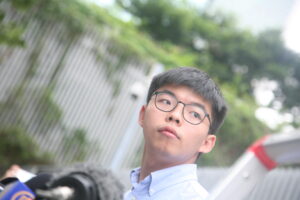Minds of the Movement
An ICNC blog on the people and power of civil resistance
by Victoria Tin-bor HuiDecember 21, 2020
On December 2, high-profile Hong Kong activists Joshua Wong and Agnes Chow received jail sentences for 13.5 months and 10 months, respectively, for peacefully surrounding the police headquarters in June 2019 against the Beijing-backed Hong Kong government. The next day, Jimmy Lai, publisher of the only pro-democracy newspaper the Apple Daily, was arrested and denied bail for violating the terms of the media’s lease.
Hong Kongers have been protesting to defend freedoms and demand democracy for decades, to no avail. With all forms of open dissent being banned by 2020, Hong Kongers are wondering if and how they will be able to keep the fire burning and not give up.
Tracing the erosion of Hong Kong’s freedom
Hong Kong is a somewhat unique case in the global struggles for freedom. Until recently, it did not seek to win freedom from a prior dictatorship. Rather, it tried to defend preexisting freedoms against a new sovereign dictatorship. Therefore, this is a case of a protracted occupation of a democratic society.
China took over Hong Kong from the United Kingdom not by conquest, but by the 1984 Sino-British Joint Declaration. Beijing promised to allow “Hong Kong people ruling Hong Kong” with “a high degree of autonomy” under a “one country, two systems” model after the handover in 1997.
For Hong Kongers, the model was meant to create a firewall shielding the city’s rule of law, independent judiciary, neutral civil service, impartial police, and free press from mainland China’s one-party dictatorship. For the Chinese Communist Party, however, the model has offered Beijing access to global finance and technologies. Once the Chinese economy and military became strong enough to rival the United States, it no longer needed to exercise restraint.
Thus, the erosion of Hong Kong’s freedom happened in slow motion at first, then sped up in the aftermath of the failed 2014 Umbrella Movement, before falling off the cliff since the anti-extradition protest of 2019.

Joshua Wong is one of more than 10,000 judges, professors, teachers, civil servants, and journalists who have been arrested among Hong Kong's pro-democracy opposition. Source: Wikipedia/Honcques Laus.
The “last stand”: Resistance to extradition
In 2019, nearly two million of Hong Kong’s 7.4 million residents repeatedly braced the scorching heat and torrential rain to protest a bill that would extradite people accused of crimes from the city to mainland China. They made “Five Demands”: the formal withdrawal of the extradition bill, an independent investigation into police abuses, an amnesty for the arrested, a recall of the “riot” characterization, and an open dialogue on “genuine universal suffrage.”
Hong Kongers called the 2019 protests the “last stand.” The conviction that they could not afford to lose this time underpinned why the protests spread so widely, escalated so quickly, and lasted so long.
A breakdown in nonviolent discipline
As the authorities remained incalcitrant in the face of repeated mass protests, some Hong Kongers concluded that nonviolent action was futile. By August 2019, protesters turned from umbrellas to firebombs. This then opened up the opportunity for agents provocateurs to flame the “riots” and “terrorist acts.” Radicalization gave Beijing the perfect excuse to impose a national security law to “prevent, stop, and punish” “secession,” “subversion,” “terrorism,” and “collusion with foreign forces” on June 30, 2020. It was clearly an excuse as Hong Kongers had returned to peaceful means, especially electioneering and unionizing, by the turn of 2020.
The authorities additionally used COVID-19 as an excuse to ban all protests in 2020. A permit must be obtained or else you are arrested for unlawful assemblies. This is what Joshua Wong and Agnes Chow are jailed for now.
In late July this year, the Hong Kong government “postponed” parliamentary elections, citing Coronavirus concerns. The pro-democracy opposition decried this as a pretext to prevent people from voting at a time when the opposition had been making steady electoral gains. Although pro-democracy legislators originally stayed on, 11 were arrested for nonviolent disruption in the chamber. Four more were disqualified for filibustering and calling for international sanctions, triggering the rest of the opposition legislators to resign in solidarity this past November.
Challenges looking forward
Beijing’s total crackdown has barely started and will intensify in 2021.
One major challenge is that Hong Kongers must confront Beijing’s leaders. In other words, this is an anti-occupation struggle that may therefore do well to focus on anti-occupation strategies. One such strategy is reaching out to the occupier’s society and building coalitions with different groups in mainland China (this has been referred to as “extending the nonviolent battlefield”). Another strategy is decreasing social distance between Hong Kongers and ordinary Chinese citizens, as was the case with the pro-democracy independence movement in East Timor that reached out to Indonesian society to make their own struggle common with Indonesians’ pro-democracy struggle against long-time autocrat Suharto.
Secondly, there is the challenge of Hong Kongers simply trying to sustain themselves and maintain civil society. One way they are doing this is what is referred to as the “yellow economic circle,” a system of identifying—and therefore enabling consumers to boycott—businesses as a function of their stance on the pro-democracy movement. Yellow shops support the protesters, blue shops support the Hong Kong police, and red or black shops are owned by the Chinese Communist Party. Developed in 2019, the yellow economic circle continues today.
Still, much more is needed to shift the course of this increasingly despairing case for the civil resistance community. Hong Kong is the new Berlin, but Berlin eventually saw the light at the end of the tunnel. Therefore, the ultimate challenge facing the movement as we transition into 2021 is keeping the fire alight in the darkest of times. In addition to physical repression and economic coercion, Hong Kongers are also having to resist the distortion of truth, the imposition of “patriotic education,” and appointments and dismissals based on loyalty.
Yet one key difference with Berlin is that China is closely tied to the global economy. Thus, in this struggle between teenagers and the new superpower, concerted global actions against Beijing’s blatant violation of its own international promises could help save Hong Kong.
Join the conversation on Twitter @civilresistance, hashtag #ICNC2020Top10
Check out our "Top 10 Civil Resistance Stories of 2020, Looking Forward" countdown, with new posts rolling out every Monday from December 14, 2020 through February 15, 2021.

Victoria Tin-bor Hui
Victoria Tin-bor Hui is Associate Professor in Political Science at the University of Notre Dame. She has testified on Hong Kong at Congress, and published in the Journal of Democracy, Foreign Affairs, Washington Post’s Monkey Cage, The Diplomat, etc.
Read More